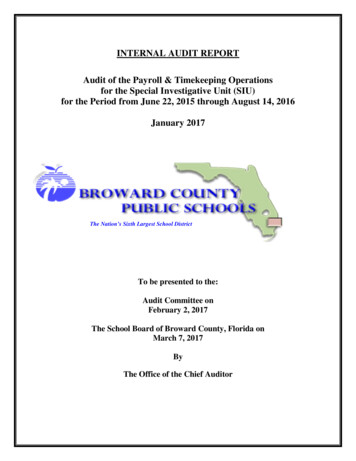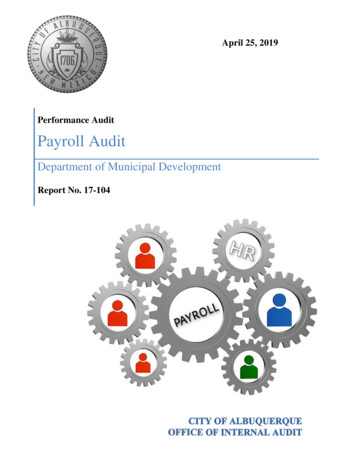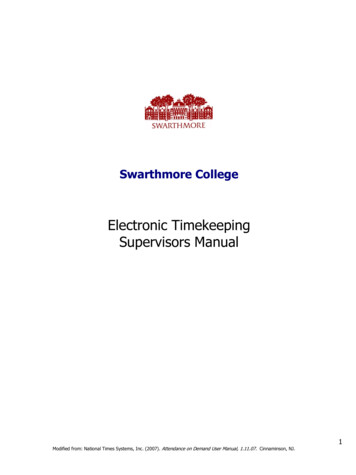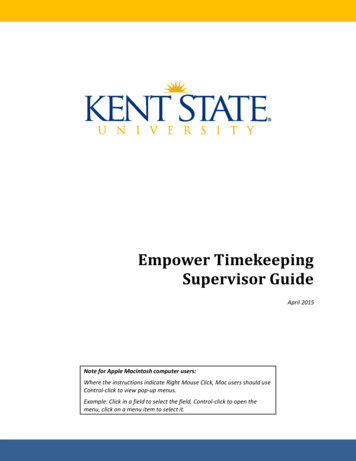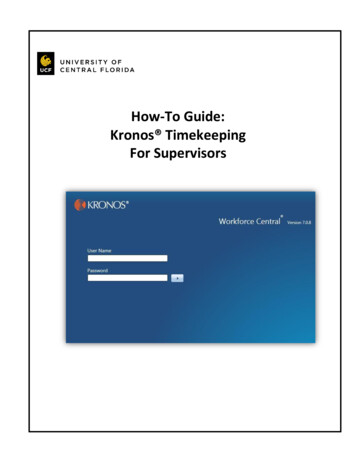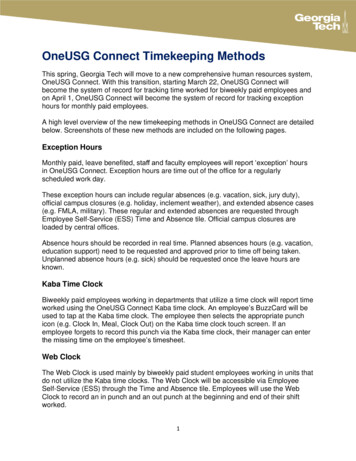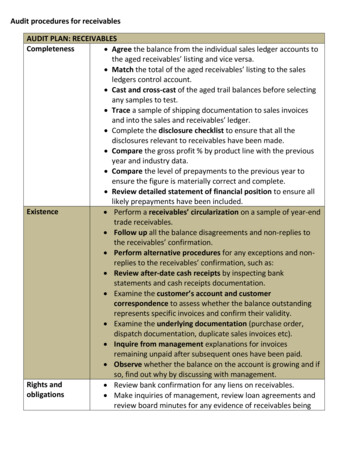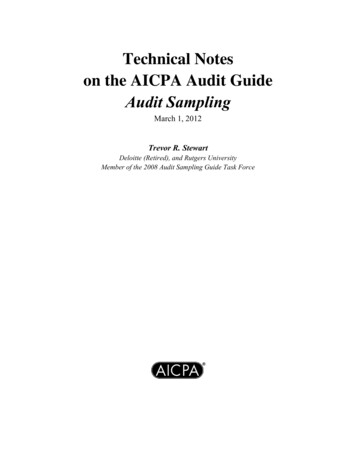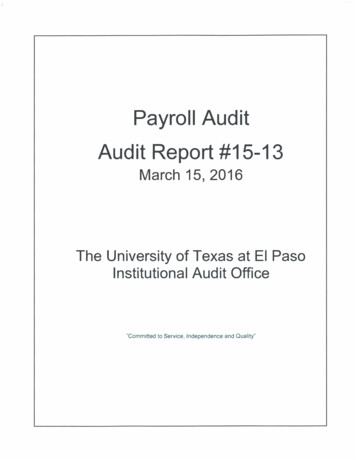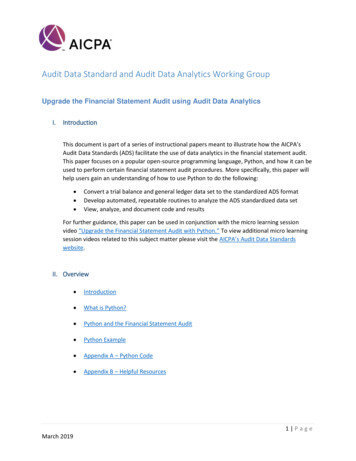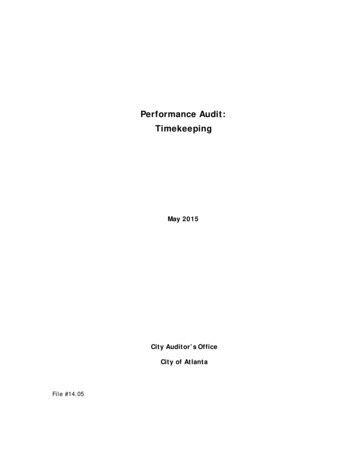
Transcription
Performance Audit:TimekeepingMay 2015City Auditor’s OfficeCity of AtlantaFile #14.05
May 2015CITY OF ATLANTACity Auditor’s OfficeLeslie Ward, City Auditor404.330.6452Why We Did This AuditWe undertook this audit because the city’sIntegrity Line has received numerouscomplaints about abuse of time andviolation of controls in the city’s automatedtimekeeping system. We focused ourreview on policies and practices forcapturing, recording, and tracking hoursworked across city departments. We alsoassessed whether controls are in place inthe timekeeping system to ensure that workhours recorded are accurate and the citycomplies with the federal Fair LaborStandards Act.What We RecommendedThe commissioners of human resourcesand law should: identify and compensate employeeswho have not been paid correctly fortheir hours workedThe commissioner of human resources andthe chief information officer should: strengthen time and attendancecontrols in the city’s timekeepingmanagement software application develop an interface to updateemployee time records that does notrequire the use of manual forms install security cameras in areas whereclock vandalism has occurredThe commissioner of human resources andthe chief financial officer should: finalize and communicate policies andprocedures on overtime andtimekeeping policiesThe commissioner of human resourcesshould: provide training and guidance todepartments on proper procedure andaccountability for documentingemployee timeFor more information regarding this report, pleaseuse the contact link on our website atwww.atlaudit.org.Performance Audit:TimekeepingWhat We FoundFederal labor law establishes minimum wage, overtime pay,recordkeeping, and youth employment standards for employeesin federal, state, and local governments as well as in the privatesector. Specifically, the Fair Labor Standards Act (FLSA)establishes rules for overtime, compensation time for publicsector employees, and record keeping requirements. The lawspecifies employees who are exempt from these standards basedon job responsibilities and functions.We found that city departments have implemented practices thatappear to be inconsistent with FLSA. Our analysis of timekeepingrecords for the first 21 pay periods of 2014 identified nearly200,000 hours for which non-exempt employees had clocked inbeyond their established workweeks and for which they mightneed to be paid. The absence of a procedural framework andsystem controls has pushed responsibility for complying withFLSA to individual timekeepers who are ill-equipped to ensurecompliance.We also identified about 7,500 overtime hours over the 21 payperiods that departments, excluding police and corrections, paidat the regular hourly rate rather than the time-and-a half raterequired by FLSA. Most of these hours were in the Department ofWatershed Management, the Department of Parks, Recreation &Cultural Affairs, and the Department of Aviation. Departmentsalso recorded more than 20,000 hours of non-exempt non-swornemployees’ compensatory accrual at straight time instead of therequired time-and-a-half. While the error affected almost 900employees in 14 departments, 36% of the hours were foremployees of the Department of Watershed Management.City staff corrects payroll records in the financial system withoutalso correcting timesheet records, potentially increasing the city’sliability for unpaid time. Departments requested about 6,900adjustments to time and leave for the first 19 pay periods in 2014on manual change sheets. Most of the adjustments timekeeperssubmitted to payroll originated in errors or omissions intimekeeping records. Delays in employees or supervisorsaccounting for missing time clock entries and for extra timecontribute to the need for corrections after payroll closes.Weak controls and enforcement increase the risk of theft of time.Lead timekeepers in nine departments expressed concern abouttheft of time alleging that employees have vandalized biometricclocks, unplugged time clocks, and punched the clock for otheremployees. We are currently investigating the allegations ofvandalism.
Summary of Management ResponsesRecommendation #1:Response & Proposed Action:Timeframe:Recommendation #2:Response & Proposed Action:Timeframe:Recommendation #3:Response & Proposed Action:Timeframe:Recommendation #4:Response & Proposed Action:Timeframe:Recommendation #5:Response & Proposed Action:Timeframe:Recommendation #6:Response & Proposed Action:Timeframe:The commissioner of human resources and the Department of Law should review records forthe last two years to identify and compensate those who were not paid for all overtime hours.HR, Law, and the relevant operating departments will review all availablerecords for the past two years to determine if any instances occurred whereemployees were not paid for overtime hours, and compensate if necessary.AgreeSeptember 2015The commissioner of human resources and the Department of Law should review records forthe last two years to identify and compensate those who were paid overtime at theincorrect rate.HR, Law, and the relevant operating departments will review all availablerecords for the past two years to determine if any instances occurred whereemployees were paid overtime at the wrong rate, and compensate as necessary.AgreeSeptember 2015The commissioner of human resources and the Department of Law should review records forthe last two years to identify and compensate those whose compensatory time was recordedas straight time instead of time-and-a-half.HR, Law, and the relevant operating departments will review all available records Agreefor the past two years to determine if any instances occurred where employeeswere paid compensatory time at the wrong rate, and compensate as necessary.September 2015The commissioner of human resources and the Department of Law should review records forthe last two years to identify and compensate those who should have been paidcompensatory time balances upon separation.HR, Law, and the relevant operating departments will review all availablerecords for the past two years to determine if any employees were not paidcompensatory time at their time of separation, and compensate as necessary.AgreeSeptember 2015The commissioner of human resources and the chief information officer should strengthensystem controls in the timekeeping system upgrade.HR will work with the CIO to ensure the time keeping system is updated tostrengthen controls, and with operating departments to ensure appropriatetime clocks are used based on type of work done.AgreeSeptember 2015The commissioner of human resources and the chief information officer should assess thefeasibility of adding the capacity to insert changes in employee time records in thetimekeeping system directly from the payroll system in the same pay period.The CIO will conduct an assessment of what will be required to develop aninterface between the time keeping system and the payroll system given thepending city-wide upgrade of Oracle and the enterprise technology plan.December 2015Agree
Recommendation #7:Response & Proposed Action:Timeframe:Recommendation #8:Response & Proposed Action:Timeframe:Recommendation #9:Response & Proposed Action:Timeframe:Recommendation #10:Response & Proposed Action:Timeframe:Recommendation #11:Response & Proposed Action:Timeframe:The commissioner of human resources and the chief information officer should installsecurity cameras in areas where clock vandalism has occurred.HR will work with IT and the operating departments to identify where camerasshould be installed to ensure accurate reporting of time.AgreeJune 2015The commissioner of human resources and the chief financial officer should finalize andcommunicate new FLSA and city code compliant policies and procedures for timekeeping andpayment of accrued compensatory time upon separation.The policy is complete and will be distributed. Monitoring and paying outcompensatory time is a Finance responsibility.AgreeApril 2015The commissioner of human resources should request changes to the city code to clarifycompensatory time accrual limits for exempt and non-exempt employees.A legislative remedy to the current code language will be presented to CityCouncil for their consideration.AgreeJuly 2015The commissioner of human resources should establish timekeeping training classes foremployees with the responsibility for entering, modifying, or approving time codes.Training classes on this topic already exist. Refresher training will take placewith the pending upgrade to the time keeping system along with the updatedpolicy roll out.AgreeJuly 2015The commissioner of human resources should provide guidance to departments aboutemployee and supervisor accountability for documenting and approving time.HR currently provides guidance to all operating departments about employeeand supervisor accountability. It is up to the departments to then in factdocument and hold their employees accountable.In place currentlyAgree
LESLIE WARDCity Auditorlward1@atlantaga.govAMANDA NOBLEDeputy City Auditoranoble@atlantaga.govCITY OF ATLANTACITY AUDITOR’S OFFICE68 MITCHELL STREET SW, SUITE 12100ATLANTA, GEORGIA 30303-0312(404) 330-6452FAX: (404) 658-6077AUDIT COMMITTEEDon Penovi, CPA, ChairMarion Cameron, CPA, ViceChairCheryl Allen, PhD, CPADaniel EbersoleMay 18, 2015Honorable Mayor and Members of the City Council:Our audit of city timekeeping focused on policies and practices for capturing, recording,and tracking hours worked across city departments. We assessed whether controls are inplace in the timekeeping system to ensure that work hours recorded are accurate and thecity complies with the federal Fair Labor Standards Act (FLSA). The city’s Integrity Linehas received complaints about employee abuse of time as well as allegations of thedefacing and destruction of time clocks at various work sites.City departments have implemented practices that appear inconsistent with the FLSA.Our analysis of timekeeping records for the first 21 pay periods of 2014 identified nearly200,000 hours for which non-exempt employees had clocked in beyond their establishedwork hours and for which they might need to be paid. We confirmed that some biometrictime clocks in the Department of Watershed Management have been rendered unusable,and we continue to investigate this destruction of city property. The commissioner ofhuman resources agreed with all of our recommendations and has begun to address them.During the audit, we communicated with human resources and information technologystaff members who are working on an upgrade of the Kronos timekeeping system, whichshould strengthen controls and aid in improving FLSA compliance.These audit findings are the latest of several indicating possible noncompliance withfederal laws and regulations. Our most recent audit of employee expense reimbursementsand reconciliations, for example, addressed apparent noncompliance with IRS payroll taxrequirements. Other previous audits also have addressed payroll tax issues concerningtake-home vehicles, mobile devices and moving expenses. While several of the specificissues have been corrected, the continuation of potential federal compliance issuessuggests a weak control environment.The Audit Committee has reviewed this report and is releasing it in accordance withArticle 2, Chapter 6 of the City Charter. We appreciate the courtesy and cooperation of
city staff throughout the audit. The team for this project was Stephanie Jackson,Susannah Laramee Kidd and Diana Coomes Lynn.Leslie WardCity AuditorDon PenoviAudit Committee Chair
TimekeepingTable of ContentsIntroduction . 1Background . 1FLSA Requires City to Pay Employees for Overtime Hours Worked . 177% of City Employees Are Non-Exempt Under FLSA . 2City Uses Kronos Timekeeping System to Enter Time . 2City Uses Oracle to Transfer Time from Kronos and Process Payroll . 3Departments Have Up to a Day and a Half to Send Timecards to Payroll for ProcessingAfter Pay Period Closes . 4Audit Objectives . 5Scope and Methodology . 6Findings and Analysis . 7Timekeeping Practices Appear Noncompliant with FLSA . 7City Might Owe Employees for Overtime Hours . 8Compensatory Time Practices May Be Inconsistent with Federal Law . 13Manual Processes Reduce Accuracy of Timekeeping Records and Increase PotentialLiability . 17Hardcopy Records Limit Data Reliability . 18Weak Controls and Enforcement Increase Theft of Time Risk . 23Recommendations . 25Appendices . 27Appendix AManagement Response to Audit Recommendations . 29List of ExhibitsExhibit 1 City Employees Covered Under FLSA . 2Exhibit 2 Methods of Entering Time in the City . 3Exhibit 3 Data Flow from Kronos to Oracle . 4Exhibit 4 Timeline for Time Capture and Payroll Processing . 4Exhibit 5 Unapproved Time Remaining by Department (Without Public Safety Employees)January 2, 2014 through October 22, 2014 . 9
Exhibit 6 Unapproved Time Remaining by Department (Only Public Safety Employees)January 2, 2014 through October 22, 2014.10Exhibit 7 Hours Worked Over 40.25 without Overtime Premium Pay .13Exhibit 8 Comparison of Total Compensatory Hours Calculated Erroneously by Departmentfor Non-Exempt Employees .15Exhibit 9 Compensatory Time Balances of .25 or More upon Separation .16Exhibit 10 Change Sheet Entries Sent to Payroll by Departments, Pay Periods EndingJanuary through September 2014.20Exhibit 11 Change Sheet Entries by Department, Pay Periods Ending January throughSeptember 2014 .22Exhibit 12 Theft of Time Violations According to Department .24List of FiguresFigure 1 Photograph of Biometric Scanner . 3
IntroductionWe undertook this audit because the city’s Integrity Line hasreceived numerous complaints about abuse of time and violation ofcontrols in the city’s automated timekeeping system. We focusedour review on policies and practices for capturing, recording, andtracking hours worked across city departments. We also assessedwhether controls are in place in the timekeeping system to ensurethat work hours recorded are accurate and the city complies withthe federal Fair Labor Standards Act.BackgroundFederal labor law establishes minimum wage, overtime pay,recordkeeping, and youth employment standards for employees inthe private sector and in federal, state, and local governments. Thelaw specifies employees who are exempt from these standards basedon job responsibilities and functions. A special provision allows localgovernments to provide compensatory time off instead of overtimepay. Additional standards apply to employees engaged in fireprotection, law enforcement, and seasonal activities. Thecommissioner of the Department of Human Resources has theprimary responsibility for ensuring compliance with applicable laborlaws. Section 114-133 of the city code requires the city’s chieffinancial officer to pay employees for overtime work in accordancewith federal labor laws.FLSA Requires City to Pay Employees for Overtime Hours WorkedThe Fair Labor Standards Act of 1938 (FLSA) requires publicemployers to: pay at least one and one-half times the employees’ regularrates of pay for all hours worked over 40 in the workweek under certain conditions, provide employees withcompensatory time off at one and one-half hours for eachhour worked, instead of paid overtime comply with recordkeeping requirementsThe FLSA allows employees engaged in fire protection and lawenforcement activities to have a work period ranging from 7 to 28days, in which they are paid overtime after 212 (fire protection) or171 (law enforcement) hours in each work period.Timekeeping1
Under the FLSA, the city is required to maintain records for eachnon-exempt employee about hours worked and wages earned. Therecords should include hours worked each day, daily or weeklystraight-time earnings, and overtime earnings for the workweek.The law does not require employers to provide vacation, severance,sick pay, meal periods, or paid holidays. FLSA also does not requireemployers to provide employees with premium pay for weekend orholiday work.77% of City Employees Are Non-Exempt Under FLSAUsing FLSA, the Department of Human Resources has designated themajority of city employees (77%) as “non-exempt” employees, asshown in Exhibit 1. The non-exempt status indicates that the FLSAemployment standards apply to them. Professional, executive, andadministrative employees are exempt from the law, and therefore,are not subject to the federal wage and hour requirements.Exhibit 1 City Employees Covered Under FLSAFLSA StatusNumber of e: Kronos timekeeping system data, as of September 2014City Uses Kronos Timekeeping System to Enter TimeCity employees document hours worked by clocking in and out, or adesignated timekeeper enters all hours worked and leave taken intoKronos, the city’s timekeeping system, on a daily basis. Accordingto Section 114-413 the city code, department heads are responsiblefor maintaining timekeeping, attendance, and leave records foremployees within their departments. Employees can clock in andout using the following methods: Swiping identification badge or entering identificationnumber into wall mounted terminalScanning finger in wall mounted terminal (biometric scan)Desktop computer time stamp entryTele-Time phone time stampThe most accurate method of entering time is by having anemployee scan a finger into the wall-mounted terminal (shown in2Timekeeping
Figure 1). Employers use the biometricfinger scan to curb employee time theft,because the user cannot punch for anotheremployee.Departments, in conjunction with humanresources, assign each employee in the citya method for entering time into Kronos.The majority of employees enter time intothe system by using the swipe method swiping identification badges into a wallmounted time clock or typing an employeeidentification number into the clock (seeExhibit 2).Figure 1 Photographof Biometric ScannerExhibit 2 Methods of Entering Time in the CityTime Entry MethodEmployee CountSwipe3,738Biometric Scan2,159Desktop2,064Tele-time142Total8,103FLSA otal2,0643,7381422,1598,103Source: Kronos timekeepi
May 18, 2015 · These audit findings are the latest of several indicating possible noncompliance with federal laws and regulations. Our most recent audit of employee expense reimbursements and reconciliations, for example, addressed apparent noncompliance with IRS payroll tax requirements. Other previous audits also have
